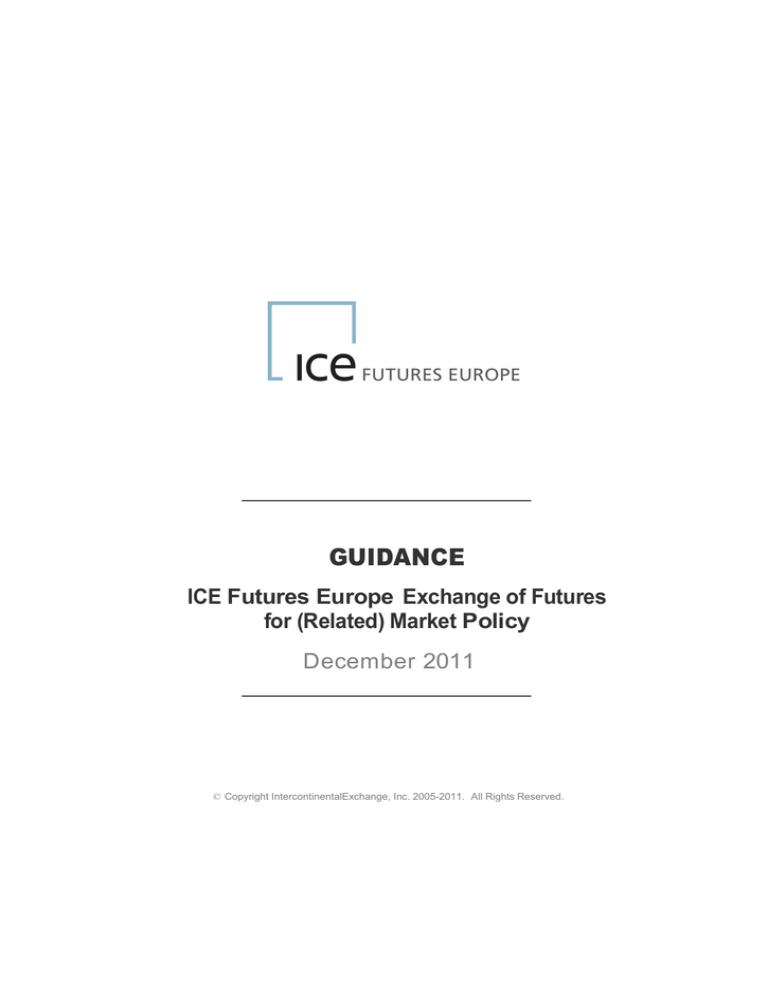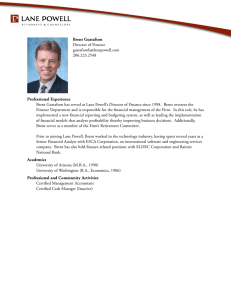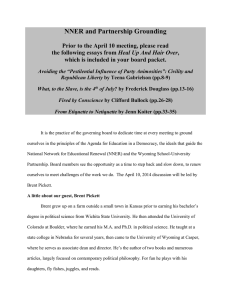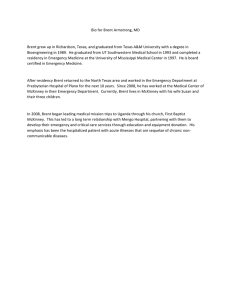
GUIDANCE
ICE Futures Europe Exchange of Futures
for (Related) Market Policy
December 2011
© Copyright IntercontinentalExchange, Inc. 2005-2011. All Rights Reserved.
www.theice.com
ICE Futures Europe Guidance on the Exchange of Futures for
(Related) Market (“EFM”) trading facility
1. General
The Exchange is introducing the ICE Brent NX Contract in order to reflect changing conditions
in the underlying North Sea market. The Exchange is both encouraging and facilitating the
migration of open interest from its existing ICE Brent Contract into the new instrument. To this
end the Exchange is introducing an Exchange of Futures for (Related) Market (“EFM”) facility,
initially allowing Members to easily exchange existing ICE Brent positions to their equivalents
in ICE Brent NX.
This Guidance contains a summary overview of the Exchange of Futures for (Related) Market
(“EFM”) facility provided by the Exchange followed by detailed Guidance on the permitted use
of the EFM facility and the factors to be considered when using it to exchange an ICE Futures
Europe Brent Futures/Options Contract (“Brent Contracts”) to an ICE Futures Europe Brent
NX Futures/Options Contract (“Brent NX Contracts”). It further includes the timings and
method of reporting the EFM transactions to the Exchange.
2. Systems, Controls and Regulations
Each Member should ensure:
that it is appropriately authorised and holds all necessary licenses and consents in
accordance with Exchange Regulation B.3.1(h);
that it has appropriate systems and controls in place in order to conduct business on the
ICE Platform;
that EFM transactions are reported in accordance with Exchange Regulations and this
Guidance;
that it acts with due skill, care and diligence; and the interests of the client(s) are not
prejudiced at all times, including when using ICE Block; and
that the relevant requirements of the Financial Services Authority’s Code of Market
Conduct are satisfied.
Failure to do so may render the Member liable to disciplinary action by the Exchange and
potentially the Financial Services Authority and/or other regulatory bodies.
3. Summary overview of EFM facilities
The EFM facility allows Members to register transactions which exchange positions from
Brent Contracts to Brent NX Contracts.
EFM transactions may only be used to reduce positions in existing Brent Contracts and
create/increase corresponding positions in Brent NX Contracts.
EFMs must be reported to the Exchange by the method set out in point 4(b) of
this Guidance.
ICE Futures Europe – December 2011
Page 2
www.theice.com
EFM transactions may be submitted to the Exchange at any time during the hours set
out below in point 5 (a) of this Guidance.
On the day of the expiry of a contract month/date, EFM transactions in respect of the
expiring contract date/month may be submitted to the Exchange up to the times set
out in point 5(a) below.
EFM transactions in respect of options for an expiring contract month cannot be
registered after the cessation of trading for the relevant expiring contract month.
The Exchange may require Members to supply documentation, such as order slips,
trader’s blotter etc as evidence that the transaction was accurately recorded and
arranged. The Exchange will be prepared to accept a deal confirmation providing that it
clearly states the terms of the transaction, inter alia: the contract month being traded, the
price or prices involved, the mechanism by which the contracts may be converted into an
ICE Contract (i.e. by EFM), the counterparties to the trade and clarifies that the execution
of the EFM is dependent on acceptance of the registration by the Exchange.
The Exchange would expect disclosure of all parties involved in the transaction when
registering the transaction with the Exchange.
From time to time the Exchange may advise Members of additional permitted uses for
EFM transactions.
EFM volumes will be included in the Exchange for Swap (“EFS”) volumes reported on
WebICE and in Exchange reports.
4. Factors to be considered when registering an EFM
The limiting factors on acceptance of EFM registration are:
EFM transactions may only be used to reduce an existing position in the Brent Contract
and exchange all, or a portion of it for a position in the corresponding Brent NX Contract.
For the avoidance of doubt:
o An EFM transaction must reduce the magnitude of the counterparties’ existing position
in the Brent Contract;
o An EFM transaction must not be for a quantity greater than the outstanding position in
the Brent Contract for either counterparty.
There is no minimum size for an EFM transaction.
An EFM transaction is registered as two legs – a Brent Contract, of opposite direction to
the existing Brent Contract and a Brent NX Contract.
The facility is not designed or intended to facilitate the transfer of funds between parties
and/or locations whether for money laundering, resolution of errors or any other purpose
other than to exchange a Brent Contract for a Brent NX Contract. If the Exchange is not
satisfied that the facility is being used for this purpose, registration will be refused;
To accommodate Members pricing/hedging requirements for off-Exchange business,
EFMs may be registered as a straight exchange between corresponding contract months
in the Brent Contract and the Brent NX Contract; or as an exchange of a given contract
ICE Futures Europe – December 2011
Page 3
www.theice.com
month in the Brent Contract for the following adjacent contract month in the Brent NX
Contract. Taking the example of a May 20nn ICE Brent position the following two
scenarios are acceptable:
May 20nn ICE Brent Position exchanges to May 20nn ICE Brent NX
May 20nn ICE Brent Position exchanges to June 20nn ICE Brent NX
No other combination of contract months will be accepted.
EFMs should only be registered within price parameters defined by the Exchange:
These parameters are currently at, or within, the following differentials from the previous
day’s official settlement price:
ICE Futures Europe Brent Futures Contract:
Plus/minus $0.30
ICE Futures Europe Brent NX Futures Contract: Plus/minus $0.30
or within the high/low range of the day.
The Exchange may amend the parameters at any time as necessary. Where the EFM is
registered between one Brent contract month and the subsequent Brent NX contract
month the price parameters will be derived from the outright settlement price or current
high/low range of the day in the respective outright Brent contract and Brent NX contract
months;
•
Any EFM to be registered which falls within one of these limits will be automatically
accepted for registration by the Exchange. Those outside these parameters will require
approval from the compliance department who may ask for further documentation in
support of the registration as outlined in Rule F.5.B. Members will appreciate that the
processing of such trades will be significantly quicker on most occasions if such
documentation is provided at the time of requesting the registration; and
5. Procedures for the reporting of EFM trades to the Exchange
a) Reporting time limits
Reporting of EFM trades may take place at any time for all Brent Futures and Options
Contracts during trading hours and for 30 minutes after the close of the relevant individual
Contract (or the close of the ICE Post Trade and Clearing Systems (“the ICE Systems”)
whatever is the earlier).
On an expiry day for Brent NX Futures Contracts, EFMs in respect of the expiring contract
date/month may be reported up to one hour after the expiry of the contract date/month.
On the expiry day for Brent NX Options Contracts, EFMs may be reported up to the end of the
designated settlement period of the underlying Brent NX Futures contract. Further details are
set out in Rule F.5.B.
b) Reporting to the Exchange
Once an EFM has been organised the Members must report the EFM details to the
Exchange in accordance with Rule F.5.B.
EFMs may be reported to the Exchange by the entry of the EFM details to the ICE Block
facility, by notification by the Member to the ICE Helpdesk, or by any other method the
Exchange may advise members of from time to time.
ICE Futures Europe – December 2011
Page 4
www.theice.com
Members may post an EFM by entering into ICEBlock both the buy and sell sides of
the trade as a cross trade.
Where the EFM is agreed between two separate Members (“Non-crossed Trade”) one
of the Members party to a Non-crossed Trade inputs into ICEBlock its own side of
the deal (i.e. either the buy or sell side of the trade) alleging the counterparty Member to
the deal. The counterparty Member to the deal is required to accept the alleged
Non-crossed Trade in ICEBlock. Once the Non-crossed Trade has been accepted by
the counterparty it flows through to the ICE Systems in the normal manner.
In order to facilitate the swift matching of Non-crossed Trades the submitting Member must
complete mandatory Order Reference and Contact Number fields to assist any queries prior to
acceptance by the counterparty Member.
Unless otherwise agreed by the relevant Members, Non-crossed Trades shall be entered by
the buying Member in respect of Non-crossed Trades in single contract months. All legs
pertaining to multi-legged strategy trades should be entered into ICEBlock by the Buyer of the
front month.
ICEBlock assigns each new trade a unique deal ID and provides an audit of all actions
undertaken on ICEBlock for that particular day.
c) Restrictions
EFMs may only be reported to the Exchange by ICE Futures Europe Members who have
been permitted access to ICE Block as appropriate. Where more than one Exchange
Member is involved in the arrangement, execution and subsequent clearing of an EFM,
each Member must ensure that the business conducted by it or through it shall not cause
it or the Exchange to be in breach of any applicable laws and/or regulations.
Members are reminded of their responsibility under Rule A.9 for the conduct of their
Member Representatives if authorising third parties to use ICE Block in such Member’s
name.
d) Registration and Confirmation
Subject to the details of the EFM being within relevant clearing risk limits, the transaction
details will flow through to the ICE Systems for registration and clearing. The process will
not continue if there are any issues with limits; in that event the issue will be highlighted to
the affected party, such affected party will need to contact the relevant Clearing Member
to remedy the issue.
The Exchange may check the validity of the EFM details submitted by the parties to the
trade. If the Exchange (following consultation, where necessary, with ICE Clear
Europe and subject to their right to refuse registration) is not satisfied that all such details
are valid, it will void the EFM. Any decision by the Exchange not to register an EFM is
final. Registration of a transaction does not preclude the Exchange from instigating
disciplinary procedures in the event that the transaction is subsequently found to have
been made other than in compliance with the Regulations.
The EFM volume, but not price, will be broadcast to the Market via the ICE Platform.
An EFM is registered with a trade type of “EFM” – Exchange of Futures for (Related)
Market.
ICE Futures Europe – December 2011
Page 5
www.theice.com
EFM Transactions entered through ICE Block will be subject to such fees and charges, as
may be notified by the Exchange from time to time.
e) Registration by ICE Clear Europe
During the consultation (where applicable) between the Exchange and ICE Clear Europe
referred to in ’Registration and Confirmation’ above, ICE Clear Europe will risk assess the
EFM and where insufficient funds are held, may call for additional margin from the
Clearing Member.
Further details in relation to the EFM or ICE Block facility may be obtained from ICE Futures
Europe Market Supervision on +44 (0) 207 382 8200.
Any questions arising from this Guidance should be addressed to:
Phil Redman - Director,
phil.redman@theice.com, or
Market
Oversight
on
+44
(0)20
7065
7703,
e-mail
Simon Martin – Compliance and Regulatory Policy Manager on +44 (0) 207 265 7777, e-mail
simon.martin@theice.com.
ICE Futures Europe – December 2011
Page 6



